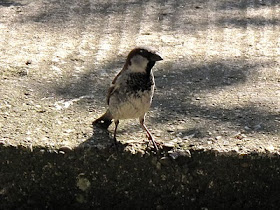Male sparrows are now beginning to show the urge of starting their breeding territories. I have seen several males chirping constantly from house eaves, a common nest site. When chirping, sparrows show off their fluffed up black chest bib. Sparrow bibs vary considerably in size between individual sparrows.

Figure showing variation in badge size in Male House Sparrows (from Moller 1987). See also the photos below.
Research has shown that bib size functions as a 'badge of status' and individuals with large badges enjoy a dominant status in the flock. Large badge individuals also obtain earlier mates as females prefer them and enjoy more reproductive success. Males with large badges seemed also better at defending their females from sexual harassment in multi-male chases. Large badges carried a cost though. Sparrowhawks, the main predators in the study took males with large bibs more often than males with small bibs during the autumn. The explanation was than high reproductive success had a cost in the condition of the bird at the end of the season. The study showed that sexual selection - female choice - and natural selection through predation acted in opposite directions in determining bib size.
A large bib male in my garden flock
A small bib male
References
Moller, A.P. 1987. Variation in badge size in male sparrows
Passer domesticus: evidence for status signalling. Animal Behaviour, 35:1637-1644.
here.
Moller, A.P. 1989. Natural and sexual selection on a plumage signal status and on morphology in house sparrows,
Passer domesticus. Journal of evolutionary Biology, 2:125-140.
here.





hey just thought i'd say i love this blog, i've done a few modules on animal behaviour in my uni course and actually used sparrow badges of status as a case study in one of my exams, i think it was Moller that did a study where he painted 'fake badges' on sparrows to see if it affected their dominance... it didn't!
ReplyDeletei think behavioural ecology is probably one of the most interesting aspects of biological science.
i'll keep following
tom
(thebeard from WAB!)
Thank you Tom! I am glad you are enjoying it, I am also learning a lot from researching the posts. At some point I have to stop and press publish or I'd go forever.
ReplyDelete